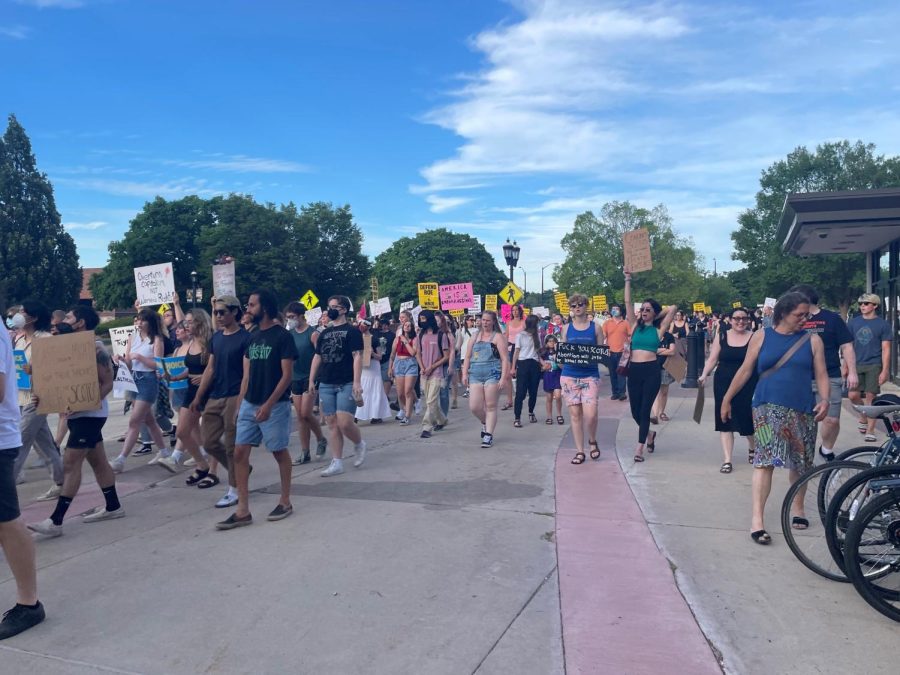Opinion | Overturning Roe ruins the Supreme Court
Protesters march towards the Champaign County Courthouse with signs to fight against the overturning of Roe v. Wade on Friday. Assistant opinions editor Talia Duffy argues that Supreme Court overturning Roe v. Wade has caused many to lose respect for the system.
June 28, 2022
On Friday, the Supreme Court of the United States officially overturned Roe v. Wade, a landmark 1973 case that guaranteed abortion rights — varying by trimester — at the federal level.
It’s no secret that the loss of this decades-old precedent is a huge blow to women’s rights, health and safety. The always-touchy topic of abortion has flooded every social media outlet and popped up in every conversation. The future is uncertain and the majority of Americans are disappointed, if not outraged.
But this decision — formally known as Dobbs v. Jackson Women’s Health — is about more than just abortion. It proves the Supreme Court has deteriorated into just another politicized arm of the government, subject to the whims of party agendas and public opinion.
This is a sad realization, but not a surprising one. Over the last ten years or so, the legitimacy of the Supreme Court has been declining; it seems to be inversely related to rising levels of hostility between Republicans and Democrats.
Both parties have manipulated checks and balances to get as many justices that align with their ideology on the bench. Most notably, Mitch McConnell blocked the confirmation of President Barack Obama’s nomination, Merrick Garland, because the nation was “in the midst of a presidential election process.” Ever the hypocrite, McConnell encouraged the Senate to confirm President Donald Trump’s nomination, Amy Coney Barrett, in October 2020 — just one month before Trump was voted out of office.
Get The Daily Illini in your inbox!
In short, the Supreme Court has been on this path of politicization for a long time. But the decision to overturn Roe is the point of no return.
The result of Dobbs was divided straight down ideological lines; the five conservative justices voted to overturn Roe and the three liberal justices, joined in part by moderate Chief Justice John Roberts, dissented.
In his majority opinion, Justice Alito argued the decision was based only on the law, and the Supreme Court acted only to rectify what they believed to be an erroneous interpretation of the Constitution.
However, the conservative side of the Supreme Court — especially Justice Thomas — seemed to be aching for the opportunity to overturn Roe. Roberts noticed this. He limited his opinion to the singular Mississippi abortion law in question and, in his concurrence, expressed confusion as to why the Supreme Court extended the ruling as far as Roe.
The reason for their hastiness is clear. After Barrett’s recent appointment, there is an unquestionable conservative majority on the Supreme Court. Overturning Roe would not be possible otherwise; liberals are more comfortable extending the constitution to modern issues and moderates are often hesitant to discard precedent.
In this way, the Supreme Court’s conservatives are acting like a political party that just gained the majority in Congress after midterm elections and decided to pass a bunch of legislation within the first week, partially to prove that they can and partially to make as much progress in their direction as possible.
Compared to Planned Parenthood v. Casey — a similar abortion rights case from 1992 that replaced Roe’s trimester system with the single benchmark of fetal viability — Dobbs is a clear political move. The Casey decision was not as ideologically divided. Indeed, the majority opinion was written by three Republican-appointed justices and still respected Roe’s status as an essential precedent.
It’s rare to see the Supreme Court reverse such a crucial case. Part of what maintains the Supreme Court’s legitimacy is its reliance on past decisions to carefully interpret the constitution, each case building upon the others. Even if a justice disagrees with applicable precedent, they are usually inclined to accept it as law. This is especially true for cases like Roe, for which the fallout of reversal is incalculable.
In the context of this decision, Justice Clarence Thomas is the most reckless of them all. In his concurring opinion, he wrote that Dobbs should be a pathway to eliminating more rights related to privacy and equal protection. This includes Obergefell v. Hodges, which guaranteed the right to gay marriage; Griswold v. Connecticut, which guaranteed the right to contraceptives; and Lawrence v. Texas, which guaranteed the right to perform sexual conduct with members of the same sex.
Thomas’ words are dangerous. For him, at least, being a justice has nothing to do with upholding the constitution, but rather pursuing a hateful, bigoted agenda.
Despite assurance from other justices in the majority that their opinion does not implicate further threats, the seed of Thomas’ thought is planted. The idea is there, at risk of growing and thriving in today’s highly polarized political climate.
All this terminology — the “conservative side of the Supreme Court”, the “Supreme Court’s liberals” — is disheartening in itself. It’s too similar to words used to describe squabbling politicians. Supreme Court justices are not supposed to be squabbling politicians.
Indeed, all respect for the Supreme Court is gone. Singer Olivia Rodrigo performed a song titled “F— You” at England’s Glastonbury Festival the day after the news broke. That kind of protest — that kind of language — is usually reserved for politicians who are outward and purposeful with their controversial views. Since when are Supreme Court justices regarded with this level of disrespect — and even rightfully so?
For a long time, I have held the Supreme Court in reverence. But after the decision to overturn Roe v. Wade, I fear and fume at future rulings from their hands.
Talia is a sophomore in Media.







